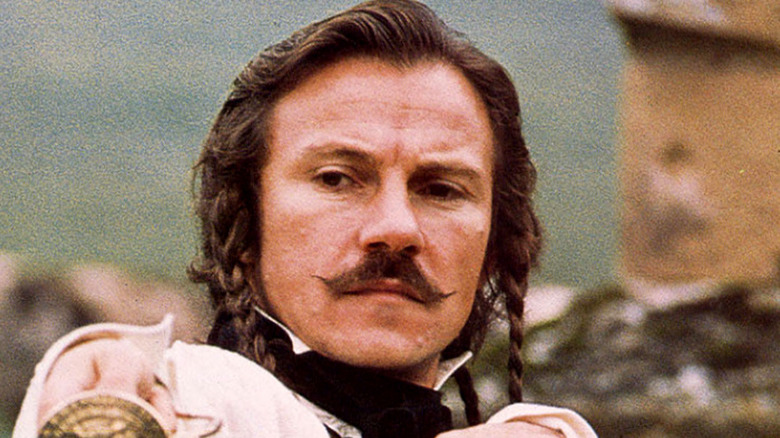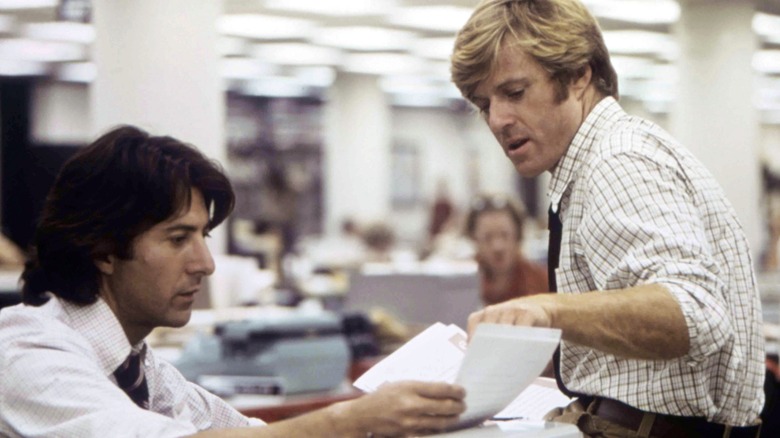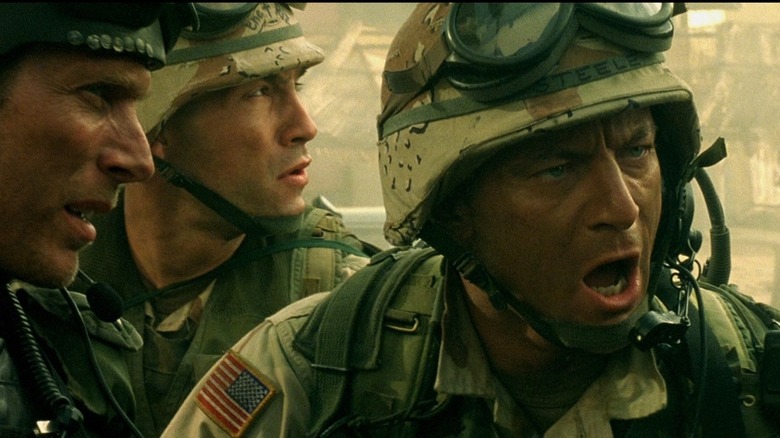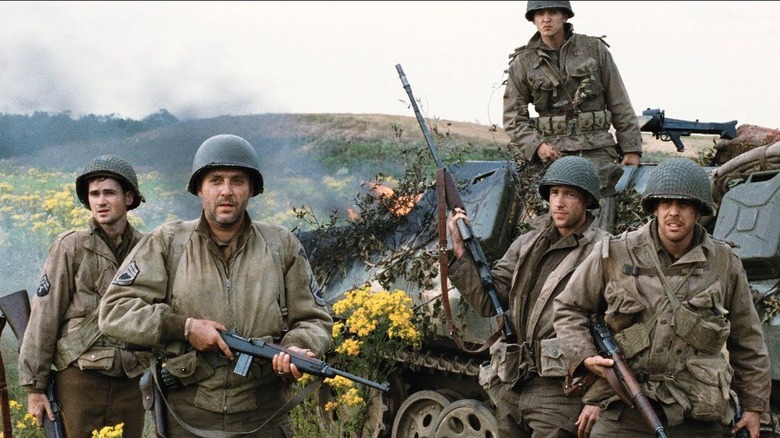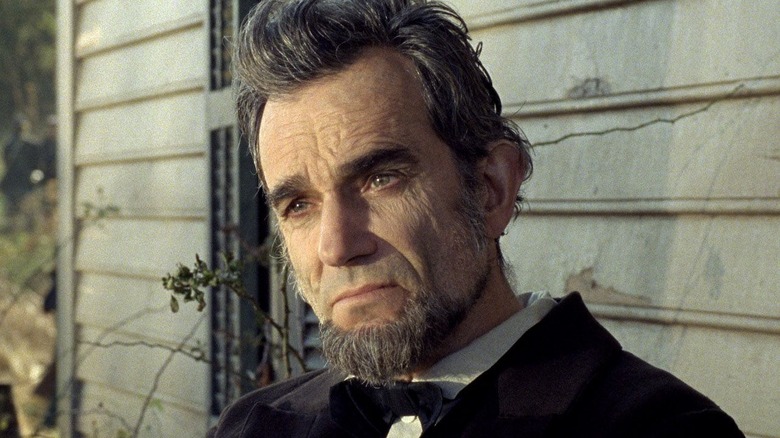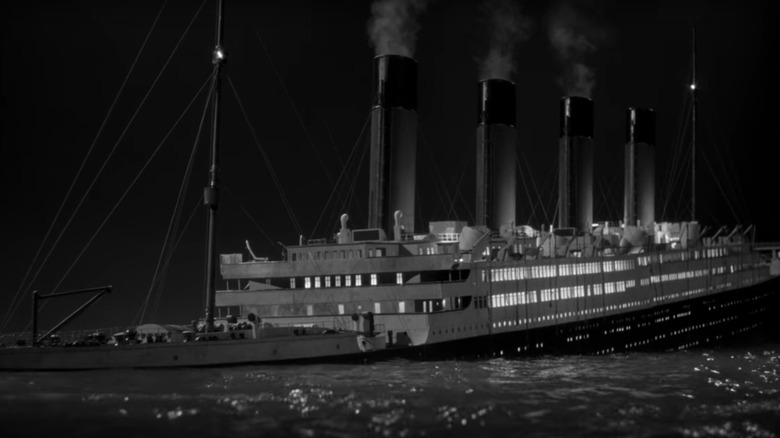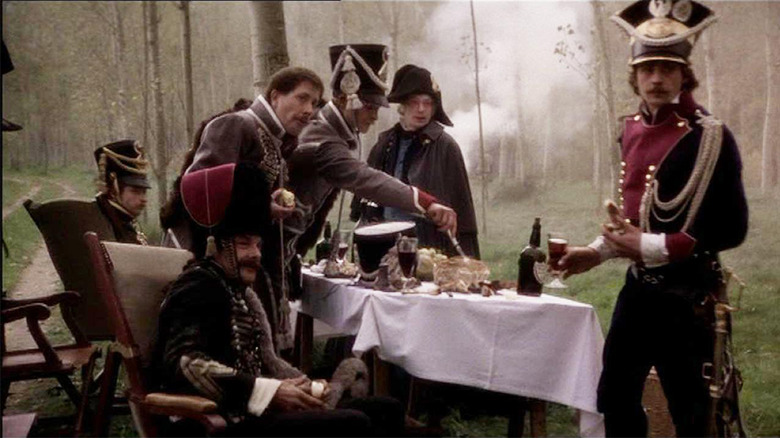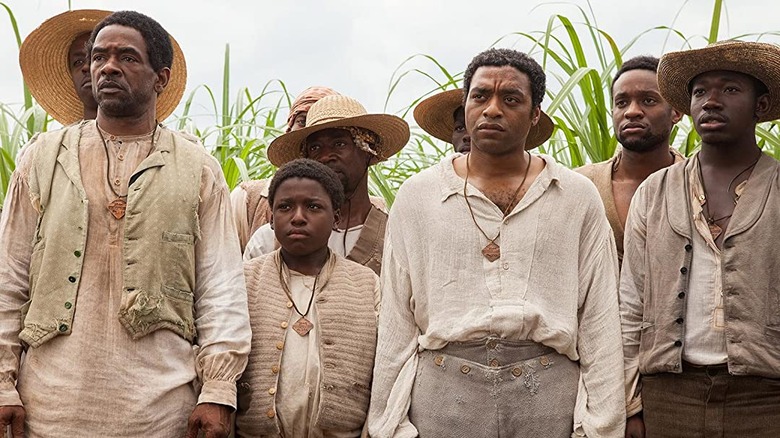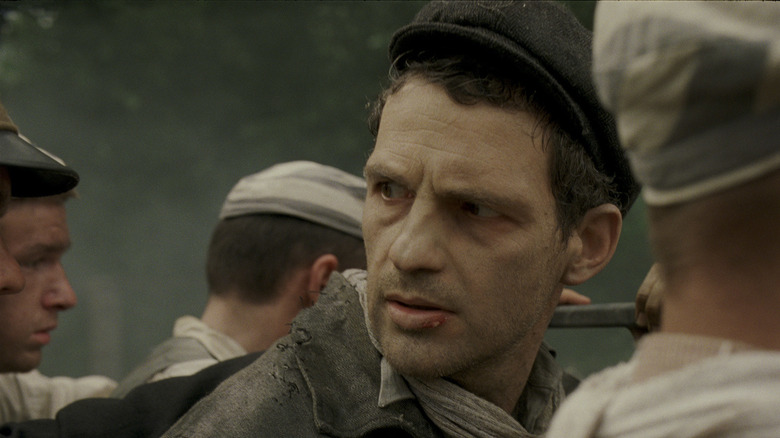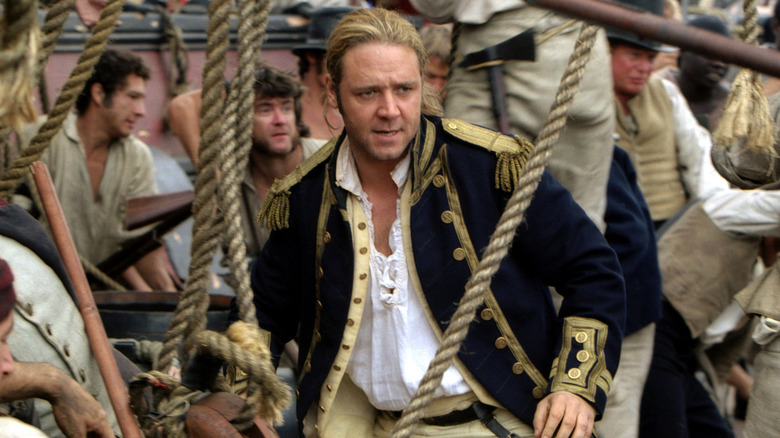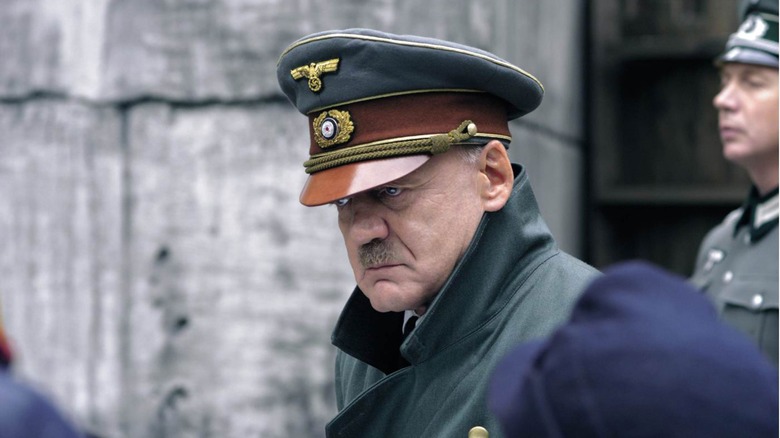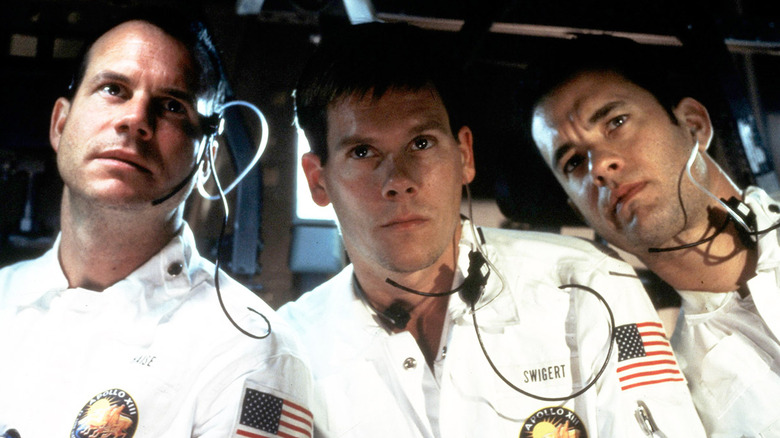Historical Movies That Actually Get History Right
Movies based on historical events aren't easy to make. Filmmakers have to strike a delicate balance between compelling drama and historical accuracy. Shoehorn in so many historical details that the story suffers, and everybody but the biggest history buffs will ignore or blast you, and your movie won't make a dime. But sacrifice too much history to make the story work, and nobody will be able to praise your film without explaining what it got wrong. Plus, internet know-it-alls will vilify you for misplacing so much as an epaulet on an officer's uniform.
Generally, it's advised to be as accurate as you can without jeopardizing the story. After all, it's not a documentary. Most people are willing to forgive minor inaccuracies if the movie is made well and in good faith. At the end of the day, nobody (well, almost nobody) really expects levels of historical accuracy beyond what the story requires.
But every once in a while, you'll see a film that goes all out to nail even the most obscure, easy-to-miss historical particulars. Though movies don't always require that kind of attention to detail, you have to respect that dedication to, and appreciation for, history. So which films are the most authentic? We've taken the liberty of assembling the 11 best; the ones that hit the sweet spot of realism and watchability. Note: This is not an exhaustive list, so don't fret if you don't see your favorite based-on-real-events flick here (notable runner-ups included "Das Boot," "Waterloo," and "The Assassination of Jesse James by the Coward Robert Ford").
11. All the President's Men
Before the latest chapter in American history turned abuse of power and outrageous political scandals into an almost weekly occurrence, there was Watergate: a cheap, two-bit burglary that escalated into a political crisis, devoured the latter half of Richard Nixon's presidency, and forced him to resign in disgrace. None of it would've come to light without the tireless efforts of now-legendary journalists Carl Bernstein and Bob Woodward, who unraveled the story bit by bit for The Washington Post.
A few years later, we got the movie "All the President's Men," based on a 1974 non-fiction book of the same name by Woodward and Bernstein themselves. They were played, respectively, by Robert Redford and Dustin Hoffman. Unlike the book, which covered the affair from start to finish, the film focuses only on the first seven months of the scandal, ending at Nixon's second inauguration. That means we miss most of the really juicy stuff that ended up crushing Nixon, but by that time the scandal had taken on a life of its own anyway, and the resulting investigation had largely shifted jurisdiction from news reporters to Congress and the legal system.
The famous quote "follow the money" appears to be an invention, and the film deviates from reality in certain respects, such as omitting pivotal newspaper editor Barry Sussman. Overall, though, its commitment to accuracy is to be admired — the crew even built replicas of period-accurate phone books. The movie is a fantastic and excellently researched examination of why we need a free press to keep would-be power abusers in check.
10. Black Hawk Down
Ridley Scott's 2001 war movie "Black Hawk Down" follows the real-life ill-fated attempt by Task Force Ranger to arrest Mohamed Farrah Aidid, a Somali warlord, during that nation's deadly civil war in 1993. The U.S. Army first takes out Aidid's arms suppliers and advisers before moving into Mogadishu for the big confrontation. However, they are met with ferocious resistance and suffer high casualties. At one point, a Black Hawk helicopter is hit with a rocket-propelled grenade and brought down in the middle of the city. While attempting to reach the crash site, where several wounded survivors were fighting for their lives, another helicopter is downed. What was supposed to have been a quick arrest and evac mission had quickly become something of a debacle for the Americans (although they predictably inflicted vastly more casualties than they sustained), who abandoned their original objective and focused on getting their boys out safely.
We can't praise "Black Hawk Down" for its cultural sensitivity; only one character voices compassion for Somali locals, who are otherwise depicted as rabidly violent fanatics. But we can certainly praise its historical authenticity and dedication to nailing the experience of being an American soldier trying to do a thankless job. Though it, too, has its ahistorical peccadilloes, the movie received considerable acclaim and is widely considered to be one of the finest war movies ever made, even if it's a bit too intense for many viewers.
9. Saving Private Ryan
It's harder to justify a fictional story being on a list like this, but we have to make an exception for Steven Spielberg's game-changing, unstoppable WW2 epic. You've almost surely seen the movie — and, if not, you've at least caught cultural references to it in "South Park" or "Avengers: Endgame."
After three Ryan brothers are killed in action, a rescue mission is launched to find the fourth, who dropped somewhere in Normandy with the 101st Airborne Division, and send him home (the plot was inspired by real events). It's a Hollywood-ized story, to be sure, especially after the first 30 minutes. It comes with some of the sappy moments and improbably easy answers to complex problems we've come to expect from Spielberg. Some viewers might even roll their eyes at the jingoistic sentiments that bookend the movie. But the rest of the film is so well executed that we can forgive those indulgences. The characters are well-written, believable, and terrifically performed. The pacing, cinematography, and editing are masterful throughout. Plus, those sappy moments work even on the most cynical viewers.
But we all know why we're really here. That sequence depicting the storming of Omaha beach was so authentic and violent that it stunned the world and took veterans right back to their own harrowing combat experiences. It's "100% accurate," reported one vet. It's not only the best battle scene ever, but in the running for the greatest scene in the history of cinema.
8. Lincoln
Abraham Lincoln is just one of those people with a life so remarkable and significant that you can't depict the whole thing in a single 2-3 hour movie with any kind of depth. To avoid overstuffing and ruining the story, you have to focus on a specific period.
That's exactly what Steven Spielberg did with "Lincoln," a movie about the passage of the Thirteenth Amendment (that outlawed slavery except as punishment for a crime) during the final months of the American Civil War. It's also a detailed portrait of a pivotal moment late in the 16th president's life. In a nutshell, Lincoln was worried that courts and returning slave states would ensure the continuation of slavery after the war, and thus decided to go all-in with a permanent constitutional solution for it, thus finishing what 1863's Emancipation Proclamation had started.
The movie got plenty of awards and even more nominations, and deserved all of them. It's also hard to beat when it comes to accurately depicting the events and people involved. The movie examines even the lesser-known figures on Capitol Hill at the time, like Thaddeus Stevens (a brilliant abolitionist played wonderfully by Tommy Lee Jones), and nails the debates surrounding the passage of the Amendment. But the shining gem here, as expected, is Daniel Day-Lewis in the starring role. As is the case with any role he takes, Day-Lewis became Lincoln. He nailed the president's famous humor and wit, as well as his less well-known, high-pitched voice and his wicked political cunning.
7. A Night to Remember
1997's "Titanic" (ever heard of it?) is arguably as famous as the event itself, but it's far from being the most accurate depiction of the events that led to the ocean liner's deadly 1912 sinking in the Atlantic. That honor goes to a much more obscure, and much older, film: 1958's "A Night to Remember." Based on Walter Lord's 1955 book of the same name and directed by Roy Ward Baker, the movie still stands out for its documentary-like style and attention to detail. There are similarities to James Cameron's film — namely, a poor passenger falls in love with a girl — but from there, the objectives of the two movies differ. Where "Titanic" was all about romance, and "A Night to Remember" was all about history.
"A Night to Remember" makes sure to cover how ice warnings were sent to the Titanic ahead of time, and how captain Edward J. Smith responded only by appointing a single lookout and refused to slow the ship or change its course. It also nails the sequence of events that preceded and followed the collision with the most famous iceberg in history, including the specific way the ship split and sank, and the reactions and fates of those on board. Besides, the few inaccuracies largely aren't the movie's fault; at the time it was made, the wreck of the Titanic had yet to be discovered.
6. The Duelists
Today, Ridley Scott is primarily known for science fiction movies like 1982's "Blade Runner" or 2015's "The Martian." But his directorial debut deserves a mention as well. Enter "The Duelists," a 1977 period piece based on Joseph Conrad's "The Duel." In this story, Gabriel Feraud and Armond d'Hubert, two French soldiers in Napoleon's Grande Armee, duel repeatedly over the course of nearly two decades after d'Hubert had attempted to arrest Feraud for nearly killing the son of a French mayor. It's a great, award-winning movie with excellent pacing, music, acting, and cinematography. And it's doubly impressive since it came from a man who, again, is known for filmmaking prowess in an entirely different genre.
While the film is definitely worth a watch simply for being good, it's essential viewing for history buffs. That's because Scott and his producers, for whatever reason, pulled out every last stop to nail the historical authenticity of the movie. Napoleonic uniforms, ranks, weapons, and military conduct are absolutely correct, as are early 19th-century fencing techniques featured in the film, to a much larger degree than you'd think would be required. Such meticulous attention to detail certainly doesn't hurt the story, and ends up becoming a draw in and of itself.
5. 12 Years a Slave
This movie, sadly based on a true story, follows Samuel Northrup (played by Chiwetel Ejiofor), a free-born Black man and traveling musician from New York who was captured by slavers in 1841 and sold around to various plantations in the South for more than a decade. He later penned the memoir on which the movie of the same name is based. The film itself won praise from critics and audiences alike, ultimately winning three Academy Awards out of an impressive nine nominations. It was very historically accurate too: the producers nailed the vernacular, sets, and costumes.
But it's the depiction of slavery itself that truly sets the film apart. Many movies have shown slaves before (though not as much as you might expect; Hollywood tends to ignore this dark chapter and its legacy in American history), but often ignore — or, worse, romanticize — the issue, a la "Gone With the Wind." Not so with "12 Years." Director Steve McQueen's masterpiece depicts everything from the routine beatings of slaves in front of their families over trivialities to the separations of families and every little dehumanizing indignity in between. In her review for HistoryExtra, Dr. Emily West said she "had never seen a film depict slavery so accurately." As the Rotten Tomatoes critic's consensus perfectly puts it, "It's far from comfortable viewing, but '12 Years a Slave's' unflinchingly brutal look at American slavery is also brilliant — and quite possibly essential — cinema."
4. Son of Saul
There's no shortage of Holocaust movies that could've made this list ("Schindler's List" certainly came close to being included), but it's hard to top the Hungarian film "Saul Fia," or "Son of Saul," Laszlo Nemes' directorial debut about a Hungarian Jew imprisoned in Auschwitz. The story follows the titular Saul Aüslander (Géza Röhrig), a member of the Sonderkommando, who discovers the body of a young Jewish boy while cleaning corpses from the gas chambers, and decides to secretly arrange a proper burial for him. Along the way, he encounters unwilling rabbis, reluctant friends, and inmates planning a doomed but noble revolt against their captors.
Of course, any semi-competent, good-faith depiction of the infamous Nazi death factory would be nightmare-inducing enough on its own. But "Son of Saul" amplifies the horror even further with a single, simple trick of cinematography: the zoom. Throughout the entire movie, the camera remains locked in an uncomfortable close-up of Saul, as he escorts the condemned to the gas chambers, hauls bodies out, scrubs the chamber, sneaks through the camp, and encounters the mercilessly evil Nazi guards who oversee the facility, murder out of boredom and beat anyone who doesn't bow when they pass. The deliberate inability of viewers to see the full picture of anything is a constant reminder of the danger. Historical accuracy meets psychological astuteness in this film.
3. Master and Commander: The Far Side of the World
This 2003 movie follows Jack Aubrey (from Patrick O'Brien's Aubrey-Maturin novels), who captains the HMS Surprise, a Napoleonic-era British ship tasked with defeating the French privateer vessel Acheron before it can threaten a British whaling fleet. The film received acclaim due to Russell Crowe's rugged performance as Aubrey, the epic action sequences, and a sharp script. It certainly deserves all the praise it gets in those areas, but perhaps its greatest achievement is how accurate it was in depicting early 18th-century maritime warfare.
Director Peter Weir went to some wild lengths to ensure his film lived up to the high standard of historical accuracy that Patrick O'Brien strove for in his novels. The ranks of the sailors, weapons, uniforms, language, and ships were absolutely nailed to a degree that hasn't been topped by any other film set during this period. Even the things that might confuse casual viewers were there for a reason, like the inclusion of children on the ship and the use of seemingly professional, polite language (lots of "sirs" and "pleases") during intense action scenes, was very accurate for the period. They even went so far as to capture the correct sound for the muskets and cannons used, rather than filling in the blanks with stock sound effects. The only disappointing thing about the movie is that it didn't make enough money to warrant a sequel — or did it?
2. Downfall
"Downfall" (in German, "Der Untergang") meticulously recreates Hitler's last 10 days, which were largely spent in the claustrophobic steel corridors of the Führerbunker beneath the Reich Chancellery in Berlin as shells rained and Soviet troops stormed the city overhead. It unsurprisingly aced the easy details, like uniforms and language, and made sure to include all the major moments that happened during those final days, like the perceived betrayals of Hitler's acolytes and the Führer's suicide. But any movie could've done that. This one went so far as to depict entire conversations between Hitler and his generals, his remaining confidants (like Joseph Goebbels), his wife Eva Braun, or his secretary, Traudl Jünge, exactly as surviving witnesses say they happened.
It wasn't uncontroversial, though. Many viewers took issue with Bruno Ganz's masterful portrayal of the Nazi dictator not as some cackling supervillain, but as a human: one who wasn't incapable of humor or even occasional kindness towards his subordinates, but who was, at the end of the day, a broken old man unwilling to let go of his violent delusions even as they brought him to the same apocalyptic ruin he'd brought upon so many millions of others. And that is exactly why the film is so enduringly powerful: it's a reminder of the destruction that can happen when we let our guard down and very real men like this ascend to power. Well, that and the memes.
1. Apollo 13
The whole world watched the first moon landing, but interest in the later Apollo missions steadily waned. It's understandable; great achievements are only either of those things the first time. But the crew of Apollo 13 found a rather unfortunate way to recapture public imagination in the space program: by getting stranded on a dying rocket after an explosion in the oxygen tank threatened to destroy the vessel. "Houston, we've had a problem here," indeed. For days, astronauts Jim Lovell, Fred Haise, and Jack Swigert fought for their lives as their wounded vessel limped back to earth. Meanwhile, as the world watched and prayed, the folks at NASA worked around the clock to get their boys home. They succeeded, but only just. Today, this "successful failure" of a mission is considered one of the greatest triumphs in the history of space travel.
And to say Ron Howard's "Apollo 13" nailed its depiction is an understatement. Not only is it an incredible movie in the traditional sense — with flawless writing, acting, editing, directing and music throughout — but it went to huge lengths to capture the moment. Meanwhile, all dialogue that took place between the Odyssey and Houston was lifted verbatim from the actual transcripts. Lots of historical films only work because of artistic liberties, but "Apollo 13" still somehow soars without taking any.
